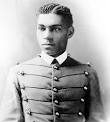|
By Adam De Gree
Henry Ossian Flipper Henry Ossian Flipper was born a slave in 1856, but he would achieve much by the time of his death in 1940. His life serves as an example of the courage and the challenges African Americans faced during Reconstruction. As the first black man to graduate from West Point and command African-American ‘Buffalo Soldiers,’ Flipper served with distinction. Yet white officers framed him for embezzlement only a few years into his military commission. Not until 1999 was his reputation restored by the United States government. Flipper was born the eldest of five to Isabelle and Festus Flipper in Georgia. His father worked as a shoemaker and carriage-trimmer for a wealthy slave dealer. After the Civil War, the family did as much as they could to better their own lives. As a young man, Flipper attended Atlanta University. There, he earned an appointment to West Point, the United States Military Academy. At West Point, Flipper and his fellow black cadets faced many challenges. White students at the academy regularly mistreated them. For example, Flipper wrote extensively about the many ways that white cadets would bully black students in order to gain the attention and favor of their superiors. Within several years he was the only black cadet who had not left the school. Flipper persevered in part because of his strong commitment to good behavior. After graduating from West Point in 1877, Flipper was given a commission as a second lieutenant. His command was a company of African-American troops in the Western outpost of Fort Sill, Oklahoma. These black frontier troops were called ‘Buffalo Soldiers’ by Native Americans. The Indians thought the hair of the black soldiers resembled buffalo fur. Flipper was the first black officer to command Buffalo Soldiers. According to army records, Flipper served with distinction at Fort Still. In addition to fighting in the Apache Wars and the Victorio Campaign, he contributed to many engineering projects. For example, he developed a system to drain stagnant pools of water that provided breeding grounds for malaria epidemics. In addition, he developed a reputation for honesty and trustworthiness with the local residents. He also started a close friendship with a white woman named Mollie Dwyer. Suddenly, in 1881, Flipper was accused of embezzling over $3,000 worth of commissary funds by Colonel Shafter, his commanding officer. He was arrested and put before a court martial. During the trial, it became clear that there was little evidence to support the allegations. Colonel Shafter repeatedly contradicted his own testimony and many witnesses testified to Flipper’s honesty. Since there was little chance of convicting Flipper of embezzlement, the court introduced a new charge – conduct unbecoming an officer and gentleman. Many argue that this charge had more to do with Flipper’s friendship with a white woman than any error he made in keeping track of military funds. He was found guilty and dishonorably discharged. Lieutenant Flipper was crushed by the dismissal. However, he resolved “to go forth into the world and by my subsequent conduct as an honorable man and by my character disprove the charges.” Over the next decades, Flipper worked throughout Mexico and the American Southwest as a civil and mining engineer, translator, surveyor, and cartographer. He became a well-respected Senate foreign relations expert on Mexican relations. Later, Flipper oversaw the planning and construction of the Alaskan railway system. His many achievements left an indelible mark on the West. Despite his continual efforts, Flipper could never get his name cleared by the Army. He tried to enlist again during the Spanish-American War and the first World War, but was denied both times. After attaining old age, he retired to Atlanta and lived with his brother until his death in 1940. Flipper’s death did not signal the end of the battle to reclaim his legacy. Several friends and family members continued to challenge the official narrative, and in 1976, the Army granted him a full pardon. However, his military rank and record would wait until a 1999 pardoning by President Bill Clinton. Today, the U.S. Army gives the Henry O. Flipper Memorial award to the most outstanding cadet at West Point in the areas of leadership, self-discipline, and perseverance. Numerous landmarks and memorials dot the country in his memory. Henry Ossian Flipper paved the way for thousands of black West Point graduates and officers who have served their country nobly. In his conduct in the Army and in the world, he set a fine example for all Americans. Interesting Questions for You to Discuss with Your Children and Students:
0 Comments
Leave a Reply. |
John De GreeJohn De Gree writes the current events with a look at the history of each topic. Articles are written for the young person, aged 10-18, and Mr. De Gree carefully writes so that all readers can understand the event. The perspective the current events are written in is Judeo-Christian. Receive Articles and Coupons in Your EmailSign Up Now
For Email Marketing you can trust. Archives
June 2024
Categories
All
|
|
SUPPORT
|
RESOURCES
|
|



 RSS Feed
RSS Feed



